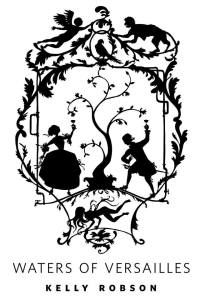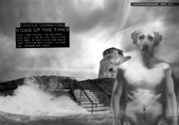TTA Press has released the third in its novella series. The first was Eyepennies by Mike O’Driscoll, which was nominated in the novella category of the  British Fantasy Awards 2013. The second, Nina Allen’s Spin, won the British Science Fiction Award 2013 for Short Fiction.
British Fantasy Awards 2013. The second, Nina Allen’s Spin, won the British Science Fiction Award 2013 for Short Fiction.
Having been lucky enough to see an advance copy of Cold Turkey by Carole Johnstone and I’m sure it will garner the same sort of acclaim.
I’m a fan of Carole’s work, particularly after reading Signs of the Times (Black Static 33). Her short stories have appeared in numerous magazines and anthologies. She has been published by PS Publishing, ChiZine Publications, Night Shade Books, TTA Press, Apex Book Company, and Morrigan Books among many others. Her work has been reprinted in Ellen Datlow’s Best Horror of the Year series and Salt Publishing’s Best British Fantasy 2013 and 2014. Her debut short story collection, The Bright Day is Done, is available from Gray Friar Press and her other novella, Frenzy is available from Damnation Books.
Carole was kind enough to let me collar her to ask her a few questions.
Tell us about Cold Turkey.
Cold Turkey is, on the surface, a story about a man called Raym, who is trying to give up smoking. He’s already a pretty unhappy guy: his parents have just died, he’s never managed to escape his Lanarkshire hometown or his long-term girlfriend, and he teaches at the same school that he used to attend as a pupil.
However, as soon as he tries to give up his pack-a-day habit, his life really begins to fall apart. He suffers nightmares and hallucinations; he starts to inexplicably lose time. And when Top Hat, one of the worst monsters from his childhood, starts stalking and threatening him, and taking a very literal tally of his shortcomings, Raym begins to wonder if he’s losing his sanity as well.
At its heart, Cold Turkey is a very dark comedy about addiction and the demons that we all harbour, but it’s also about how we create them, deal with them, deny them, manipulate them, feed them, need them. And I’m sure that there will be plenty readers who recognise at least a part of themselves in Raym, and who will certainly suffer an empathetic shiver or two at his predicament.
When I read The Pesthouse (Black Static 28) and my personal favourite, Signs of the Times (Black Static 33), I thought Modern Scottish Gothic. Why did you return to Scotland for Cold Turkey? How does it shape your writing?
That’s a great description! And it describes exactly how I feel about both the country and my writing about it. Scotland has a wildness to it, a beautiful bleakness that I’ve never really encountered elsewhere. Even in a city, you’re never very far from space and silence. I’ve lived in the southeast of England for a long time, and the two places couldn’t be any more different. That’s not down only to the Scottish landscape or weather, although both invite vivid and easy description. Scotland is home to me; it has an honesty and immediacy that welcomes anyone and everyone. If it was a character in a story, it would be stubborn yet kind; harsh yet sentimental.
Although I often write stories set elsewhere, I find myself returning to Scotland more and more often, party down to familiarity, I guess – write about what you know and all that – but also because I love and miss both it and the people who live there, and never cease to find inspiration in both.
Top Hat in his tally van is delicious. Tell us more about his evolution.
Thank you, I think he is too! And Warwick Fraser-Coombe’s cover illustration of him was just terrific – exactly how I’d imagined him.
At his most basic, he’s a mash-up of all that frightened me as a kid: the Child Catcher in Chitty Chitty Bang Bang; clowns (Pennywise is definitely in Top Hat); a myriad of Roald Dahl characters.
Top Hat’s most frightening aspect, for me, is his humour rather than his horror. In many ways he’s personable, nearly charming. You almost want to laugh along with him, despite his psychopathy. I was hugely affected by Heath Ledger’s Joker. He was by turns narcissistic, funny, charming, unpredictable, threatening, vulnerable, and incredibly frightening. There is a lot of him in Top Hat – even down to the dodgy make-up!
Cold Turkey balances a plethora of childhood fears with very adult modern day concerns and horrors, such as disease, death and anxiety about where we are in our lives and where we think we should be. What made you think about smoking as a gateway in to all that?
In the life of a smoker, I think that there’s always a moment when you start being afraid of it; a moment at which you think, “shit, I’d better think about stopping now.” It goes hand in hand with that slow-sliding recognition of your own mortality. In your teens and twenties you are nearly completely oblivious; certainly, you give it little thought, and then at some point that denial just stops.
We all go through that transition, but we deal with it indifferent ways. I went through a period of intensely obsessing over how I was going to die, but that kind of anxiety is, I think, unsustainable. I read somewhere once that our evolution into developing a sense of our own mortality was, by necessity, offset by a reflexive and subconscious optimism over which we have no control. That might come as news to pessimists like me, but apparently the only people who see the world as it actually is are those in which this ‘offset’ is unable to work, for example, the clinically depressed. I have no idea if this is true or not, if it is then it’s certainly depressing, but it is true that we have so much to deal with in our lives, so many decisions, so many uncertainties. Being afraid of a monster is easy, it’s passive. Knowing that your own choices are dangerous, but being unable or unwilling to change them is much harder to reconcile. Smoking is just the most obvious metaphor for that. But so are so many other things: staying in a job you hate, a relationship that is wrong or abusive, a mindset that is destructive.
You have an enviable ability to balance your horror with humour and a succinct style (such as “he died parchment thin and raving”). Who, if anyone, influenced the way you write?
Ah, you can interview me anytime, Priya! Most of my writing, even that which could be called mainstream, tends to veer towards the dark, but there is almost always humour in it too. I find that the most engaging, interesting, touching and affecting stories, the kind of stories that speak to me as a reader, a person, almost always embrace both. For me, humour can make the frightening more frightening in a way that relentlessly miserablist or horrific writing can’t. It renders characters more human, situations more believable; I immediately want to invest more of my own emotions into the reading.
It can be hard to get the balance right: you don’t want to come over as flippant or disjointed or just plain confusing, but so many writers that I love – that I basically want to be when I grow up – do that unbelievably well. Stephen King is the most obvious one perhaps, particularly as I spent my teenage years reading him more than anyone else, but I think that Joe Hill does it even better. Horns is an amazing novel. Other examples would be Irvine Welsh, Christopher J Yates, Denise Mina, Michael Marshall Smith, and Graham Joyce among many, many others.
What other work can we look forward to from you this year?
I have a short story collection called The Bright Day is Done coming out from Gray Friar Press in the next month, which I’m really excited about. I also have a story, Catching Flies, appearing in Ellen Datlow’s Fearful Symmetries anthology, coming from ChiZine Publications in May, and my Interzone short, Ad Astra, is being reprinted in Salt Publishing’s Best British Fantasy 2014, coming in June. There are a few other possibilities in the pipeline, but they remain, alas, only possibilities as of this moment, so nothing I can blab about yet!
I am definitely turning towards novel writing as opposed to the short story form though – Cold Turkey is, I guess, my attempt to bridge that gap, although novel-length writing does tend to take you out of circulation a bit.
I understand that you plan to return to Glengower as a setting for a novel? Can you tell us anything about it?
It’s been put on the backburner for the moment because of other projects, but I certainly intend to return to it one day. I was a little leery of turning Glengower into a Castle Rock or Innsmouth, but fictional towns that resemble places and geography that you know as a writer are pretty irresistible. This particular as yet unnamed novel takes place in Glengower over one weekend, and involves a sinkhole, a BB parade, and a badminton marathon – oh yeah, and a few murderous nasties!
Will you ever return to the world of Signs of the Times again? (I ask hopefully).
I love Edinburgh, Leith in particular, as it’s where my mum’s side of the family is from and I know it very well. I guess my Leith is very far from Irvine Welsh’s Leith; it’s very different from Leith full stop: the Leith of my childhood and the Leith of today, but I loved writing Signs of the Times. I loved imagining the place as some eerie last bastion on the edge of the world, the edge of oblivion. When I wrote Signs of the Times, I always felt that it was only a small part of a potentially larger work, and I certainly find myself coming back to it again and again in my mind. So to answer your very kind question, yes! At least I hope so.
You are a physicist- will we see any “hard” science fiction from you in the future, or is this something that doesn’t attract you?
Unfortunately, my knowledge of physics doesn’t extend much beyond the medical and radiation fields. I’m nowhere near clever enough to attempt anything too cerebral or theoretical! I do enjoy reading sci-fi, but struggle to stay engaged with the hard stuff. I love the more character-driven novels of writers like Michael Marshall Smith and James Smythe. I’ve only ever written two sci-fi stories, both for Interzone, and of those, Ad Astra is probably the only one that counts as proper sci-fi: it features a couple exploring the furthest reaches of the solar system in a solar-sail-powered ship, and disliking (very much!) what they discover. I had a blast writing it, but to be honest, the amount of research I had to do was a bit prohibitive. I’d rather stick to fictional Lanarkshire towns and apocalyptic docklands!
Thanks Carole!
Buy Cold Turkey
http://carolejohnstone.blogspot.co.uk/
 I praised Cate Gardner‘s “The Bureau of Them” and “When the Moon Man Knocks”, both of which have received British Fantasy Award nominations.
I praised Cate Gardner‘s “The Bureau of Them” and “When the Moon Man Knocks”, both of which have received British Fantasy Award nominations. finalist for the 2016 Theodore Sturgeon Memorial Award).
finalist for the 2016 Theodore Sturgeon Memorial Award).



